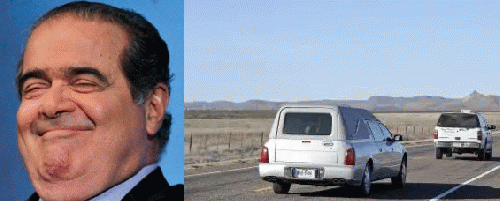By Dave Lindorff
It's appropriate that Supreme Court Justice Antonin Scalia died at a luxury resort while freeloading as the guest of thus far unidentified wealthy sponsors as one of 40 guests at a private quail-hunting vacation party.
The resort where he died, Cibolo Ranch Resort, located on land stolen by its founder from the Apache and Comanche people in the Big Bend region of west Texas, is a posh retreat favored by the ultra rich, offering rooms priced from $350 to $800 a night -- and the bed Scalia died in was the top-priced presidential suite, as he was the guest of honor. His credit card didn't need to be swiped when he checked in, since reportedly the guests at the gathering all had their bills covered by the resort's owner, John Poindexter, a mullti-millionaire real estate owner, rancher and former investment banker.)
The acerbic, blunt-speaking Scalia made his name as a High Court judge accepting freebies from wealthy businesspeople and right-wing outfits like the Federalist Society, even taking free trips and vacation junkets from the likes of the aptly-titled "Vice" President Dick Cheney back in 2004 when Cheney had a case pending before the court involving an effort to force the VP to disclose what oil company executives had attended a closed meeting in his office on energy policy early in the first term of the Bush-Cheney administration. (Scalia, notably, did not recuse himself from hearing that case.)
We don't at this point know what Scalia's final junket was about -- Poindexter makes a point of saying it "wasn't about politics or law" -- but it's no surprise he wasn't there on his own dime. That wasn't the way Scalia operated. Indeed, so egregious and frequent were Scalia's junkets that in October 2015 the New York Times wrote an editorial condemning them and calling for a reform to make such legalized bribery illegal.
Supreme Court justices, unlike members of Congress, don't need to report such things as who takes them on luxury hunting trips. They are simply required under a vague judicial ethics standard to recuse themselves when they themselves feel they have a conflict of interest. Scalia made it abundantly clear, during his record 30-year tenure on the Supreme Court bench, that he did not feel getting freebies from the wealthy, affect his his judicial judgement even when his benefactor had a case pending before him...
For the rest of this article by DAVE LINDORFF in ThisCantBeHappening!, the independent, uncompromised, five-time Project Censored Award-winning online alternative news site, please go to: www.thiscantbehappening.net/node/3043
(Article changed on February 14, 2016 at 17:37)
(Article changed on February 15, 2016 at 07:16)
(Article changed on February 15, 2016 at 11:15)
(Article changed on February 15, 2016 at 11:18)






